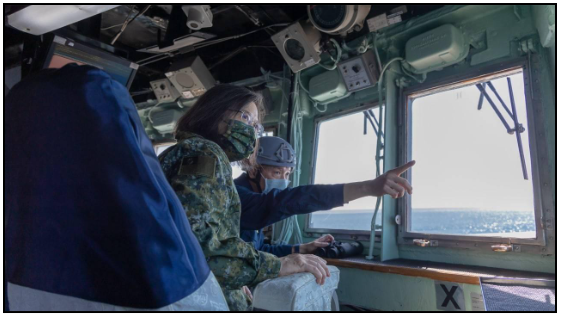Efforts by China to influence and interfere in democratic processes in Taiwan go back several years. in the mid-1990s, the Chinese regime used military exercises in an attempt to influence the 1996 presidential elections—the first free and direct public selection of a Taiwanese leader in the nation’s history. Overt threats, however, backfired and contributed to the election of the candidate whose defeat Beijing had sought to engineer.
Since then, the Chinese regime has refined its influence tactics, and sought instead to prop up, through propaganda, financial assistance and other means, candidates which it regarded as more amenable to Beijing’s unification strategy. For many years, this meant helping Kuomintang (KMT) politicians and a handful of others from pro-unification parties like the New Party. At some point during the second term of the Ma Ying-jeou (馬英九) administration, the Chinese Communist Party (CCP) lost faith in the KMT’s ability to deliver on unification efforts. This was largely the result of democratic forces compelling KMT politicians to increasingly reflect the wishes of the Taiwanese population, and the knowledge that Taiwanese voters would use electoral retribution against those who failed to do so. The KMT’s decision to switch out its initial candidate, Hung Hsiu-chu (洪秀柱), ahead of the January 2016 general elections, sealed the KMT’s fate. [1] Months later, People’s Liberation Army (PLA) Major General Zhu Chenghu (朱成虎), an influential commentator, publicly bemoaned the KMT’s apparent lack of initiative on unification.
Beijing has now intensified its efforts to bypass both the central government in Taiwan and, increasingly, the two main political parties, the KMT and the ruling Democratic Progressive Party (DPP). Instead, it relies more and more on co-opted candidates, political parties, and various proxies in Taiwan to undermine democratic institutions, sow confusion within the public, and engineer electoral outcomes in its favor. This strategy is both an admission that previous strategies have failed, and an acknowledgement that as long as it stands, Taiwan’s “democratic firewall” will prevent outcomes desired by Beijing.
Principal means
While disinformation, “fifty cents” harassment, and computational propaganda were utilized in the lead-up to the 2016 elections, evidence of direct and sustained efforts by Beijing to directly meddle in elections in Taiwan with the aim of affecting their outcome only emerged in the context of the November 24, 2018, nationwide local elections in Taiwan. In October 2018, the Ministry of Justice Investigation Bureau (MJIB) confirmed that Beijing was interfering in the elections and revealed it was investigating 33 cases of suspected Chinese funding of various candidates. Stating it had evidence the money is coming directly from the Chinese government—primarily the State Council’s Taiwan Affairs Office—the MJIB added that the funds were reportedly funneled to candidates favored by Beijing via Taiwanese business people with operations in China. Influential community members were also offered all-expenses-paid visits to China in return for assistance in helping select candidates win the elections. Two underground money exchanges, suspected of playing a role in the illegal money transfers to political campaigns, were raided by law enforcement officials. There is also reason to believe that crime syndicates, “dual use” Chinese firms with operations in Taiwan, as well as pro-Beijing political parties like the China Unification Promotion Party (CUPP, 中華統一促進黨) headed by Chang An-le (張安樂), and groups such as the Concentric Patriot Association of the ROC (CPAROC, 中華愛國同心會), both of which are fielding candidates in the elections, may also be involved in such activities.
Besides money, China also ramped up its psychological warfare, propaganda efforts and disinformation campaign, using “content farms” (內容農場), “troll factories” (巨魔工廠), and various pages on social media platforms (PTT, Facebook, Youtube channels) — some with suspected ties to the PLA Strategic Support Force (PLASSF, 中國人民解放軍戰略支援部隊) [2] — to saturate the environment, support selected candidates, and sow confusion among Taiwanese voters ahead of the election. Groups supporting KMT or independent candidates also amplified Chinese disinformation or generated their own. Additionally, poor editorial practices in Taiwan, characterized by lack of corroboration and high competitiveness in the news environment, further contributed to the dissemination of rumors and disinformation.
By early November, Taiwanese authorities had identified four municipalities in which such efforts were particularly active. Candidates favored by Beijing, from the “blue” and “green” camps, as well as a number of independents, were known as “little brothers” (小老弟). The sobriquet was highly indicative of the nature of the relationship between Beijing and its subjects.
Taiwan’s intelligence and law-enforcement authorities also warned that the political warfare aimed at the local elections were “trial runs” in preparation for the 2020 general elections, in which Beijing would seek to deny, as it has already threatened, re-election of President Tsai Ing-wen (蔡英文) and instead help install a pro-Beijing candidate. [3]
Principal aims
Beijing’s interference in Taiwan’s electoral processes is driven by two directives. The first and more traditional one is to distort democratic processes through use of money, “fake news,” intimidation, and other means to advantage candidates who are either pro-Beijing or highly critical of the Tsai Administration. This approach is reminiscent of tactics used by the Communist Party of the Soviet Union (CPSU) in Eastern and Central Europe (e.g., Czechoslovakia) in the opening phase of the Cold War, where it used the veneer of democracy—and democracy itself—to install autocratic regimes that were subservient to Moscow. [4] If elected, those candidates will be expected to assist Beijing in bypassing central government institutions in Taiwan and perhaps to work toward unification alongside trusted United Front proxies such as the CUPP, the “Tainan Cross-Strait Exchange Promotion Association” (台南市兩岸交流協會), and the “Cross-Strait Taiwan Guangdong Exchange Association” (台粵交流協會會).
The second aim is more devious and just as harmful to Taiwan. Its effectiveness is contingent on how investigators and prosecutors handle this delicate situation. Both the pro-Beijing camp and a not-always entirely loyal opposition could use investigations targeting certain candidates — and their potential disqualification from the elections — as “proof” that the Tsai government is using state institutions to meddle with the elections. Through this, and with a sustained disinformation campaign, Beijing could attempt to cast doubt not only on the outcome of the elections, but, just as if not more damaging, the entire democratic process itself. If the public loses faith in the mechanisms and legitimacy of elections, democracy can be in serious trouble. Much like propagandists who seek to engineer a world where the objective truth no longer exists and where every “fact” has become dubious or questionable, a campaign that successfully discredits electoral processes could sow enough doubt that the public comes to believe that all elections are a sham.
Underpinning much of Beijing’s political warfare and propaganda efforts against Taiwan is the goal of undermining the effectiveness of, and belief in, Taiwan’s democratic institutions. The “democratic firewall” itself is the problem, as it prevents the realization of outcomes that are sought by Beijing. Thus, even if Beijing’s favored candidates did not win in the November elections or in 2020, China could still “win” by striking a blow against Taiwan’s democracy, and hope to continue its erosion until such a time where democracy no longer stands in the way.
The main point: Even if Beijing’s favored candidates did not win in the November elections or in 2020, China could still “win” by striking a blow against Taiwan’s democracy, and hope to continue its erosion until such a time where democracy no longer stands in the way.
[1] Among other things, Hung advocated a firmer adherence to “one China” than that which has characterized the KMT’s long-standing policy. Her proposal had little traction, even among traditional “blue” voters.
[2] Established in December 2015 as part of the PLA’s major reform to be in charge of cyber, electronic, information and space operations.
[3] Independent candidates are particularly attractive to Beijing, as they can largely operate outside the intra-party constraints and checks and balances that normally result from institutionalization and which prevent clean breaks with longstanding policy. Having lost hopes of finding partners within Taiwan’s main political parties, the CCP may therefore place its bets on populist candidates who have no affiliations with those.
[4] See Robert Gellately, Stalin’s Curse: Battling for Communism in War and Cold War (New York: Knopf, 2013).



